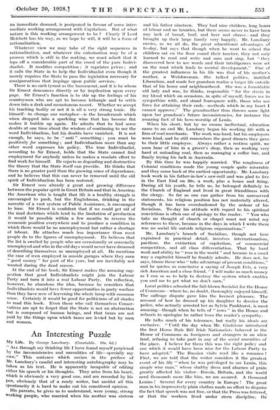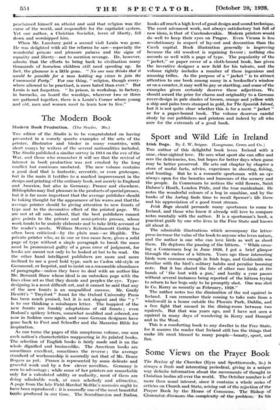An Interesting Puzzle
My Life. By George Lansbury. (Constable. 10s. 6d.) " Au, through my thinking life I have found myself perplexed by the inconsistencies and unrealities of life—specially my own." This sentence Which occurs in the preface of Mr. Lansbury's candid and interesting autobiography may be taken as his text. He is apparently incapable of editing either his speech or his thoughts. They arise from his heart, which is obviously a very good one, and are recorded by his pen, obviously that of a ready writer, but amidst all this spontaneity it is hard to make out his considered opinion.
His parents, he gives us to understand, were young, strong working people, who married when his. mother was sixteen-
and his father nineteen. They had nine children, long hours of labour and no luxuries, but there seems never to have been any lack of bread, beef, and beer and cheese—and they brought up their large family very happily. Mr. Lansbury envies, as we all do, the great educational advantages of to-day, but says that though when he went to school the children sat on the floor round their teacher, they not only learned to read and write and sum and sing, but " they discovered how to use words and their intelligences were set on the road which leads to mental development." One of the greatest influences in his life was that of his mother's mother, a Welshwoman. She talked politics, instilled - Liberalism, and made her grandson realize a larger life outside that of his home and neighbourhood. She was a formidable • old lady and was, he thinks, responsible " for the strain in my blood which on occasions, in spite of myself, forces me to sympathize with, and stand foursquare with, those who use force for attaining their ends—methods which in my heart I cannot approve." The grandmother thus throws some light upon her grandson's future inconsistencies, for instance the amazing fact: of his hero-worship of Lenin.
When his short, but by no means ineffectual, education came to an end Mr. Lansbury began his working life with a firm of coal merchants. The work was hard, but his employers were kind, and he still remembers the good dinners they gave to their little employee. Always rather a restless spirit, we soon hear of him in a grocer's shop, then as working very hard at _unloading coal, then as managing a coffee bar, and finally trying his luck in Australia.
By this time he was happily married. The roughness of Colonial conditions made the young couple quite miserable and they came back at the earliest opportunity. Mr. Lansbury took work in his father-in-law's saw-mill and was glad to live in the East End on 30s. a week, plus a house and firing.
During all his youth, he tells us, he belonged definitely to the Church of England and lived in great friendliness with the clergy. So far as one can gather from his unreserved statements, his religious position has not materially altered, though it has been overshadowed by the ardour of his Socialism. To-day his attitude with regard to his spiritual _convictions is often one of apology to the reader. " You who take no thought of church or chapel must not mind my references to these, because in the days in which I write there was no social life outside religious organizations."
Mr. Lansbury's branch of Socialism, though not here explained in practical detail, involves internationalism, pacifism, the extinction of capitalism, of commercial competition, and all class differentiation. That by hard work and ability he " rose in the world " and became in a small way a capitalist himself he frankly admits. He does not, he says, blame those who " take advantage of present conditions," and he quotes as conclusive a saying of Joseph Fels, a very rich American and a close friend, " I will make as much money as I can so as to help to destroy the system which enables you and me to get what we don't earn."
Local politics schooled the full-blown Socialist for the House of Commons—where he, no doubt, thoroughly enjoyed himself.
The suffrage dispute gave him the keenest pleasure. The account of how he dressed up his daughter to deceive the police, who actually arrested her as Sylvia Pankhurst, is most amusing—though when he tells of " rows " in the House and refusals to apologize he rather loses the reader's sympathy.
He talks much of his tolerance, but really his ideals are exclusive. " Until the day when Mr. Gladstone introduced the first Home Rule Bill Irish Nationalists behaved in the House of Commons as foreigners and strangers in an alien land, refusing to take part in any of the social amenities of the place. I believe for them this was the right policy and one which it would have been wise for the Labour Party to have adopted." The Russian visits read like a romance ! First, we. are told that the writer considers it the greatest event of his life " when he was privileged to see Lenin, this simple wise man," whose shabby dress and absence of pride greatly affected his visitor—Russia, Britain, and the world need thousands more like him, we are assured. A thousand
Lenins ! Several for every country in Europe ! The great man in his impressively plain clothes made no effort to disguise the fact that speech was not free, or that the Press was fettered, or that the workers lived under stern discipline. lie
proclaimed himself an atheist and said that religion was the curse of the world, and responsible for the capitalist system. Yet our author, a Christian Socialist, lover, of liberty, fell down and worshipped him.
When Mr. Lansbury paid a second visit Lenin was gone. He was delighted with all the reforms he saw—especially the wonderful prisoas • and pleasure palaces and the signs of equality and liberty—not to mention revenge. He, however, admits that the efforts to bring back to civilization many thousands of homeless children still need speeding up. In fact. the glamour is a little gone. " No one now thinks that it would be passible for a man holding my views to join the Communist Party." For one thing, " religion, though every- where allowed to be practised, is more hated than ever." But Lenin is not forgotten. " In prison, in workshop, in factory, in barracks, on board the warships, wherever two or three are gathered together, there is a Lenin's Corner where young and old, men and women meet to learn how to live."































































 Previous page
Previous page